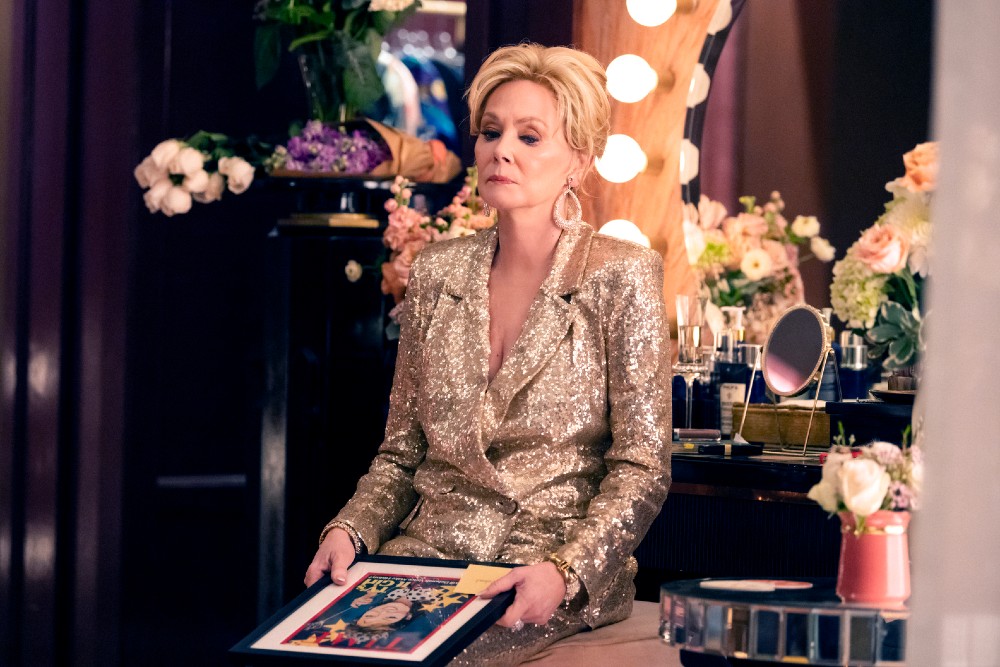
Probably one of the biggest surprises of the past year in television is how the HBO Max comedy series, Hacks, seemingly arrived out of nowhere in mid-May and immediately got everyone’s attention. The show received 14 Emmy nominations right out of the gate, which is seemingly unheard of or at least rare. (ABC’s Modern Family received 14 nominations its first season in 2010. It would end up winning 22 Emmys over the course of its run. For the sake of transparency, Apple’s Ted Lasso received ten Emmy nominations this year.)
Hacks stars Jean Smart as a veteran stand-up comic, Deborah Vance, an icon with a long-running Las Vegas residency who is in desperate need of newer material. Her agent Jimmy (played by the show’s co-creator Paul W. Downs) introduces Deborah to his other client, Ava (real-life stand-up Hannah Einbinder), a recently “cancelled” comedy writer, to help pump up Deborah’s material, so she can retain that residency. The ten episodes of the first season deal with that contentious relationship between new comedy and old, between what comics of Deborah’s generation had to deal with before the younger Ava was even born.
Editor Jessica Brunetto received her first Primetime Emmy nomination for her work cutting the show’s pilot episode and also edited three of the nine other episodes, and she already had quite an impressive resume as far as modern television comedy is concerned. Brunetto also made her directorial debut this year with a short called Sisters, starring Sarah Burns and Mary Holland, which premiered at the South by Southwest Film Festival back in March.
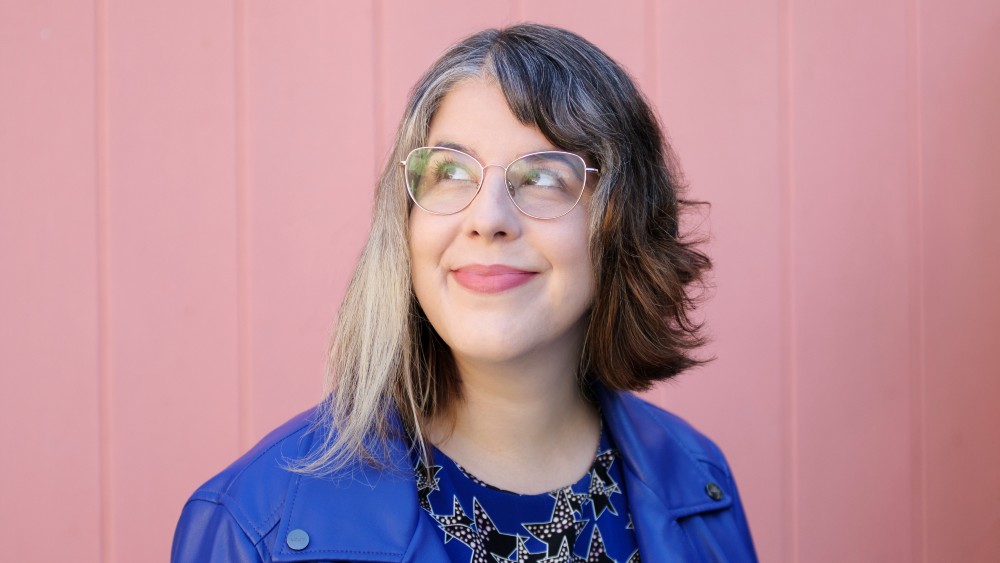
Below the Line got on the phone with Ms. Brunetto to talk about the ins and outs of making one of the most inspiring comedies of the year.
Below the Line: Let’s start by discussing your career pre-Hacks. You started out editing for Michael Moore, which is kind of jumping into the deep end. Were you doing other things before getting into editing?
Jessica Brunetto: Fresh out of college, I did do a little bit of PA work, but I knew pretty early on that I wanted to start my career in post-production. I felt pretty strongly that the editing room was kind of where the magic happens, and where you make the hard decisions. And then you really have to know how to deliver a finished product that’s very polished and compelling. So, to me, as an aspiring director, I felt like I could learn the most about directing from the edit room and kind of reverse engineer the process.
BTL: Did you go to school specifically for editing? Or did you go to film school?
Brunetto: I went to SUNY Purchase, and it was a directing program, but you kind of get a chance to learn all the crafts and basically editing and directing and writing, to be honest, were my three favorite things. They were kind of like the Holy Trinity in my eyes.
BTL: You’ve edited Broad City and Miracle Workers, so you tend to do a lot of comedy. What got you going in that direction? Michael Moore does documentaries, but they always have some comedic elements to them, so did that help hone your skills towards comedy?
Brunetto: Absolutely. Working for Michael Moore on Sicko, I was an assistant editor, but I got to edit a lot and learn a lot from those editors I worked with. And then, on Capitalism: A Love Story, I got brought up as an editor. It was an interesting time, because I went into documentary thinking that I wanted to be part of a conversation of some serious subject matters that are happening in society. I realized that his approach to making everything sort of humorous, and the way you can have those serious facts given to your audience, but if you make them laugh, that’s really what’s going to resonate with them. That became super-appealing to me. I found myself essentially doing comedy punch-ups in the edit room, and I realized [that] laughing all day at work was really kind of like lighting me up inside. When I wanted to get into scripted that sort of [guided me].
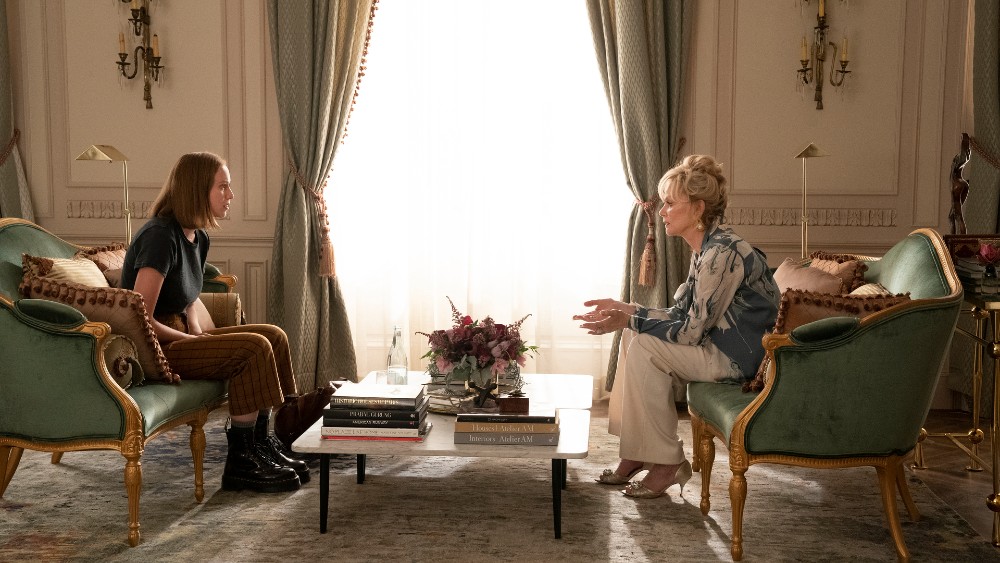
BTL: Did you do television or movies first as far as scripted?
Brunetto: It was television first, in terms of narrative. It was an Adult Swim show created by Jon Glaser called Delocated. At the time, they were looking for documentary editors, but that could also cut comedy, because so much of the scenes were scripted, but then they would shoot, an hour’s worth of improv almost for every scene. So you did a lot of sculpting in the edit room.
BTL: Did you work with the creators of Hacks on something else before?
Brunetto: I worked with Lucia Aniello and Paul W. Downs on a limited series they created with Ilana Glazer called Time-Travelling Bong. It was a 4/20 special, essentially, and that led me to start working on Broad City, which Lucia and Paul were also a part of as directors, producers and writers. And then Lucia and I also worked on Awkwafina‘s Nora from Queens together, and we cut that pilot together — she directed it. So when Hacks came along, I was, luckily, their first call and honored to be their first call.
BTL: Hacks was quite a surprise for me, since I don’t watch a ton of television. I started hearing people talking about it almost immediately, and I started watching it weekly as new episodes debuted, which is very rare for me. I’m usually a couple years behind everyone else. Was it fairly organic to move over to that project when it began?
Brunetto: Again, I had worked with Lucia so much in our director-editor relationship that it was good and comfortable to come into a situation where you already have a shorthand. I think both of us are perfectionists, in our own ways, and so I think that we are very comfortable and trusting of each other to 1.) Feel free to try crazy ideas, but 2.) Know that we want to have things super-polished and pitch-perfect, as they say.
BTL: Did you cut the pilot first before working on any of the other episodes?
Brunetto: It was at the same time as the other episodes, but obviously, it was shot in the first block with Episode 103 and Episode 102 — they were all shot at the same time, for the most part. So we kind of got a head start and were focusing on the pilot, but it was an interesting process, because we started shooting in November and then the final Las Vegas Unit didn’t happen till April. So we were kind of tinkering with the pilot for quite a long time.
BTL: That’s November of last year or November ’19?
Brunetto: November of 2020.
BTL: So the whole thing was done during the pandemic, I guess.
Brunetto: Yeah, which was another learning curve of just like editing over Zoom. For me, there was an absence of hearing people laugh, as you’re in your room watching things together. Sometimes, honestly, I was watching them over Zoom more than I was watching my editing screen, just so I could feel what they were reacting to.
BTL: Were you already editing last November?
Brunetto: We started editing the day after the first day of production, essentially.
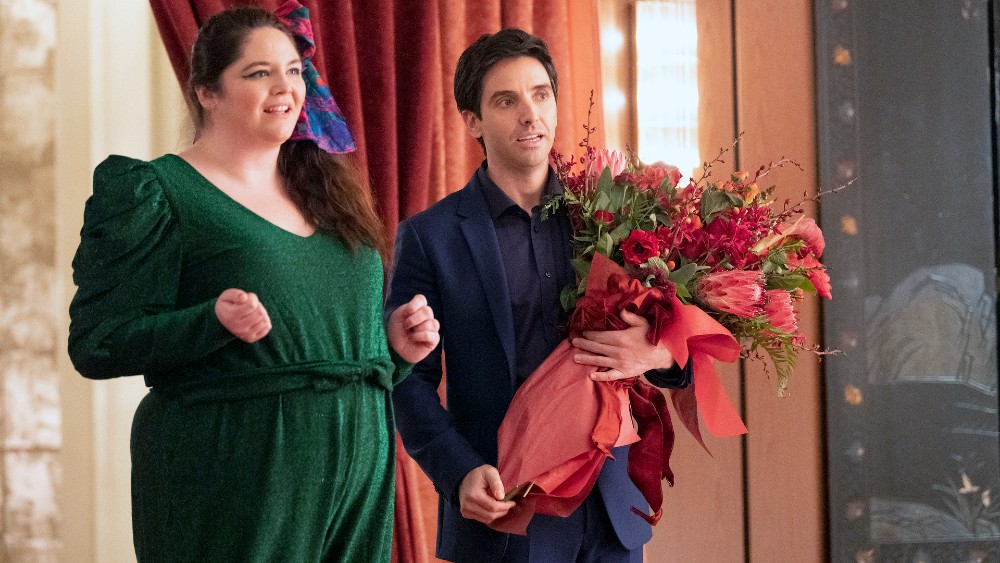
BTL: You edited four of the ten episodes, so were those spaced out between the different shoots?
Brunetto: Yes and no. Basically, I was cutting the bulk of Episode 101 and 103 at the same time, because they were all in the first block. And then, I got a bit of a break when they went into block two, those episodes were assigned to the other two editors, and then I had Episode Six come along, and then Episode Nine at the very end.
BTL: I had wondered whether you were getting the footage as each episode was being shot, or if you edited the pilot first and then began work on other episodes as schedule required.
Brunetto: Well, there were constant schedule changes throughout, because of COVID. But we were just on our toes, ready to pivot, depending on what they were shooting.
BTL: The show mostly takes place in and around Las Vegas, and in some ways, it may have been easier to shoot things when the town was quieter.
Brunetto: I think that is partially true, especially when they were scouting things, but I do believe it ended up getting pushed towards the end of the shoot, just like when the numbers kind of were going back down.
BTL: Were you able to watch the other episodes as they were edited, so when you started your later episodes, you could see what was done in between?
Brunetto: Absolutely. I was always kind of checking in even in the early stages of how the other episodes were coming together, and what sort of performance choices were being made, what sort of music choices were being made, or pacing. I think it’s just really important that the whole season feels cohesive. Especially when you’re still working on the pilot, as the rest of the other nine episodes are evolving. It should inform each other. It shouldn’t just be a one-way street, where the pilot is the Bible and everything done in the pilot should dictate the other episodes. There were just times when, again, I feel like music is like a big thing. Our score was constantly evolving, so then I could return to the pilot and be like, “Oh, maybe this is better” or “Maybe we should look at Jean Smart takes that are a little more like smirky and sassy,” stuff like that. Over time, it’s kind of almost like a checks and balances in the department, in my opinion, from like a creative standpoint, though, too. You’re there to execute the showrunners’ vision of what they want the show to be, and that is bigger than just one episode.
BTL: How many directors ended up directing the ten-episode first season?
Brunetto: There were three directors total, but two of the three were showrunners. So, Lucia and Paul did the bulk of the directing. I’m not gonna lie that really helps the editorial department, having things feel consistent. They already are in charge on set, so they’re getting what they want to get, and it definitely helped us also move quickly through the edit process. We were trying to hit the deadlines for the Emmys, so this show in particular had a very accelerated schedule this season.
BTL: Doing that while dealing with COVID things must have made it all a little more hectic.
Brunetto: They pulled off a miracle, I’m not gonna lie. They had one of the toughest shoots I’ve heard of in my career. I don’t think the content suffered, and that is an incredible feat.
BTL: Not at all. I talk to many in the industry, who have been working through the pandemic, and I’m not sure people 10 years from now will watch this stuff and even realize that was the case.
Brunetto: Honestly? People don’t even know now. People are surprised to hear Hacks was made entirely during the pandemic, and I was like, “Oh, it was.” [laughs]
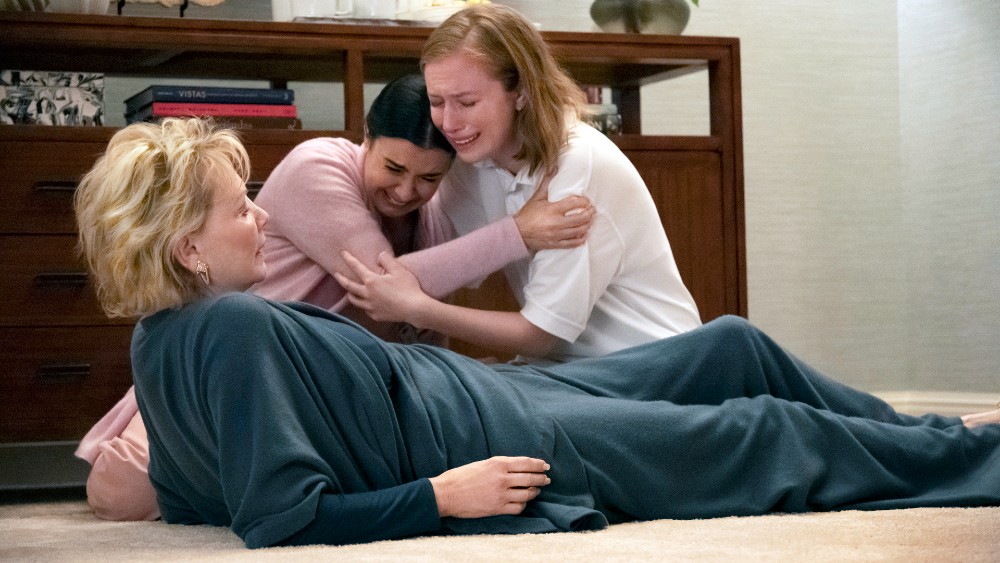
BTL: People find a way to make art and entertainment, for sure. You spoke about the different editors, and I really like the flow of each episode within the whole season, which is something I noticed more, not because I binged it, but because I watched each episode fairly close together. I can really see that flow from one episode to the next. Did the showrunners discuss wanting the later episodes to feel more dramatic or less comedic as the story moved in that direction?
Brunetto: What was discussed, I think, essentially always comes at the script level in terms of what we’re given. When I first showed them Episode 106, when she gets the plastic surgery around her eyes, it was an interesting conversation, because everyone was really blown away and touched by Jean’s performance and how personal and intimate and raw it became towards the end of the episode. We also had a big conversation about how that’s why the stuff with the nurse Perla [Iris Bahr] has to be so crazy and vague and funny, just to sort of balance out the sadder parts of the episode. It’s a bit of a case by case basis, depending on what the material really calls for.
BTL: I assume there’s a lot of improv on Broad City and maybe some on Miracle Workers. Is there a lot of improv on Hacks or does it depend on who is directing? Is there stuff that isn’t scripted you have to fit into the story?
Brunetto: There is quite a bit of improv. I felt like the majority of the improv was coming in the scenes that were between Jimmy the agent [played by Downs] and his assistant Kayla [Megan Stalter]. Both of them are just geniuses at improv, and so it became very playful. Sometimes, they would shoot so much, and there would be so much good stuff that actually we would add… in Episode 109, we added an extra mini-scene between them from leftover footage, because we just were like, “Well, this works for story, and it’s funny. Let’s try it.” It was something I did in my Editors Cut, that I co-edited with my longtime assistant, Marissa Mueller. She did a great job with me on that episode, and it stuck. That’s always like a really big victory for editors, if they can really elevate scenes or create moments that aren’t even scripted, but that really end up being the best choices.
BTL: That relationship may have surprised me the most about the series, because yes, it’s very funny, but you don’t expect it to take on such a life over the course of the series.
Brunetto: I think that it’s such a likeable dynamic. I think they realized that early on, and actually, once they really discovered that in production, they did add more moments with them than originally planned.
BTL: I haven’t seen your short, Sisters, but I did see the trailer for it. I know you have more festivals lined up, so do you have some idea when others can see it?
Brunetto: In the immediate sense, Flickers Rhode Island International Film Festival is playing it. It begins, I believe, August 9. They’re doing a mostly virtual festival. Our streaming service right now is Curia.TV. It’s a new app that has curated a bunch of shorts and features. Well-known features, too, that have done well at film festivals, which is really great. We just got accepted into the El Paso Film Festival, which I believe is in October, and there are a few more that are not publicly announced. It’s awesome. We’re still playing festivals, we’re getting on streaming apps. I mean, for a short film, I’m really proud of how much exposure we’ve gotten.
BTL: I’ve always found it can be tough going with shorts, because there’s rarely a long shelf life outside of festivals and maybe now on streaming. Are you able to get out and promote the short via virtual QnAs around your editing schedule?
Brunetto: The festivals have been very accommodating to help set up press interviews. And there are some future Q and A’s that we believe are happening. It’s been really great to be part of that community, even if we can’t be in the same room. I think everyone’s really trying to step it up and make it feel like a worthwhile experience for the filmmakers.
You can watch the entire first season of Hacks on HBO Max, and Ms. Brunetto’s short, Sisters, via Curia.TV. You can also watch the trailer for Sisters below.
All photos courtesy HBO Max; photographer credits as listed.





